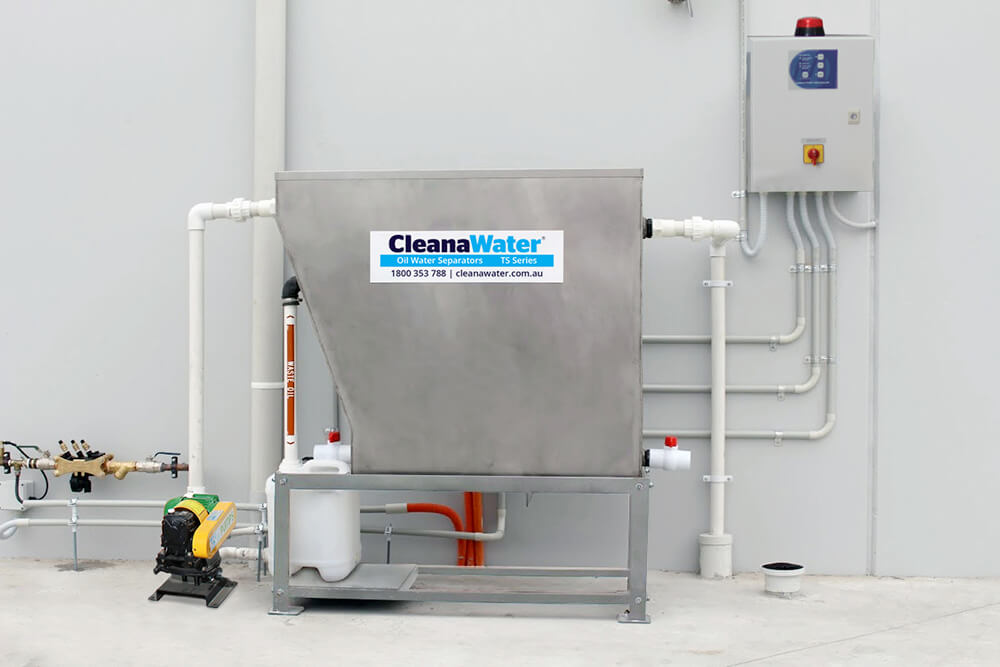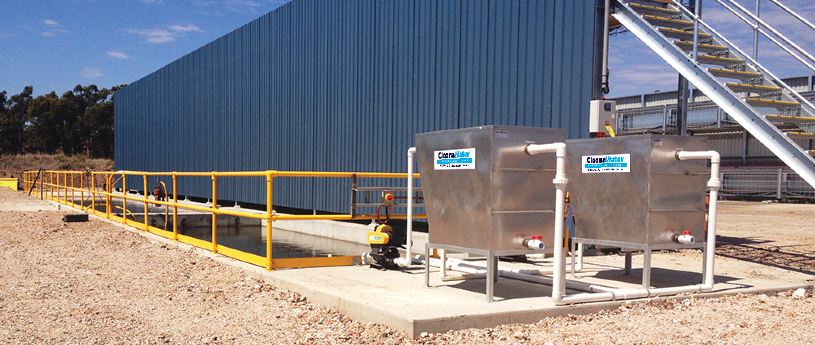Oil water separators for every industry
In the intricate web of industries and environmental responsibility, the unsung heroes known as oil water separators emerge as vital guardians. Their significance goes beyond the surface, extending to preserving clean water streams and the delicate balance of our ecosystem.
In this article, we deep dive into the world of the oil water separator and the various types that safeguard clean water and uphold environmental sustainability.
Regulatory compliance: why oil management matters for businesses
Proper oil management is not just a best practice—it’s a legal requirement in many industries. Governments around the world have introduced strict regulations regarding water discharge and oil separation to protect public waterways and ecosystems. Failure to comply with these regulations can result in hefty fines, legal issues, and reputational damage for businesses.
Key regulations for oil discharge
Different countries and regions have established guidelines that dictate acceptable levels of oil in water discharged from industrial facilities. For example, Australia’s Environmental Protection Authority (EPA) has stringent guidelines on permissible oil content in wastewater. Understanding and adhering to these regulations is vital for companies looking to operate within the law and maintain their environmental responsibilities.
Benefits of compliance for businesses
-
Avoid penalties: Adhering to regulations helps businesses avoid costly fines and legal repercussions for unnecessary oil spills.
-
Improve sustainability: Demonstrating environmental responsibility enhances a company’s reputation and attracts eco-conscious clients.
-
Operational efficiency: Implementing an oil water separator system leads to smoother operations and less environmental risk.
Understanding oil water separators
Unveiling fundamental purpose
Often unseen but always impactful, the oily water separator plays a pivotal role in maintaining the purity of water streams. Their core mission revolves around separating oil and water mixtures, ensuring that contaminants are extracted before water is discharged into the sewer.
Addressing unique challenges
While the overarching purpose remains constant, the challenges posed by diverse industries and scenarios are anything but uniform. This underscores the need for tailored solutions that adapt to specific separation challenges in mining, transportation, or industrial processes.
Gravity separators
Harnessing density dynamics
Gravity separators are a testament to the elegant dance of physics. These separators capitalise on the disparities in density between oil, suspended solids, and water. Given the lower density of oil, it naturally rises above the denser water, creating distinct layers—a separate oil layer atop a water layer.
Layered simplicity
The magic of gravity-driven separation lies in the formation of these layers. The separation process requires minimal intervention, as the distinct layers facilitate effortless emulsified oil removal from the surface. This streamlined approach makes gravity separators an excellent solution for various separation challenges.
Coalescing plate separators
Promoting droplet unification
Coalescing separators introduce a touch of sophistication to oil-water separation. Their central focus revolves around forcing oil droplets to unite into larger masses—a process known as coalescence. This transformation simplifies the separation, making it easier to extract oil from water.
The role of specialised plates
The heart of coalescing plate separators lies in their ingenious design. Specially engineered plates serve as catalysts for coalescence, creating a conducive environment for oil droplets to merge. As these droplets congregate, they transform from scattered entities into larger, distinct masses that can be effortlessly separated from the water.
API separators
Navigating oil and gas realms
API separators take the stage in oil and gas, where precision is paramount. These separators owe their name to the American Petroleum Institute—a nod to their significance in the industry. Their role extends beyond mere separation; they serve as linchpins in maintaining operational efficiency and environmental compliance.
Trifecta of separation
API separators tackle a trinity of free-floating oil particles, water, and sludge components. Their intricate design accommodates the nuances of these elements, ensuring they part ways seamlessly. As the mixture enters, the separation process unfolds. Oil, buoyant by nature, rises to the surface while denser water and solid sludge settle below. This orchestrated dance of separation is orchestrated to perfection by API separators.

Hydrocyclone separators
Centrifugal symphony
Hydrocyclone separators showcase the elegance of centrifugal force in action. Their foundation rests on harnessing the power of spinning motion to drive separation. This dynamic force, resulting from the swirling motion within the separator, propels oil and water separation.
Swirling precision
A vortex is created within hydro-cyclone separators—a swirling whirlpool that envelops the oil-water mixture. The centrifugal force at play pushes heavier water towards the periphery while lighter oil migrates to the centre. This precise segregation ensures that the two substances are delineated and ready for efficient extraction.
Our oil water separators are compliant across Australia
Our oil-water separators are designed to meet environmental regulations throughout Australia, ensuring a dependable and eco-conscious solution for wastewater treatment in any region. Built with compliance in mind, these systems effectively manage pollutants, supporting your commitment to sustainability and regulatory standards.
Western Australia
In Western Australia, the Department of Water and Environmental Regulation (DWER) oversees wastewater management and oil separation systems. Compliance with these regulations ensures facilities can discharge treated water safely.
Use Cases:
-
Mining operations
-
Heavy industrial sites
-
Marine transport hubs
Benefits:
-
Helps meet DWER standards, preventing environmental damage
-
Reduces risk of non-compliance fines and operational interruptions
New South Wales
The NSW Environmental Protection Authority (EPA) enforces strict regulations on wastewater disposal and treatment for industries.
Use Cases:
-
Car washes
-
Auto workshops
-
Manufacturing plants
Benefits:
-
Compliant with NSW EPA guidelines for safe disposal
-
Protects businesses from fines and shutdowns
-
Suitable for small and large-scale operations
South Australia
In South Australia, oil separators must comply with the Environmental Protection Authority (EPA) SA guidelines for wastewater disposal and hydrocarbon management. Compliance is crucial for industries to avoid environmental breaches.
Use Cases:
-
Petrol stations
-
Industrial workshops
-
Transport depots
Benefits:
-
Ensures compliance with SA EPA guidelines
-
Reduces risks of contamination to water sources
-
Protects businesses from costly fines
Queensland
The Department of Environment and Science (DES) in Queensland regulates water quality and wastewater treatment. Businesses must comply with regulations to prevent harmful discharge into the environment.
Use Cases:
-
Mining and natural resources
-
Heavy industry
-
Agricultural processing facilities
Benefits:
-
Helps businesses meet stringent environmental regulations
-
Minimises risks of environmental fines and penalties
-
Designed to handle heavy-duty industries
Tasmania
In Tasmania, the Environment Protection Authority (EPA) ensures that wastewater treatment systems, including oil water separators, meet strict standards to prevent pollution and protect local ecosystems.
Use Cases:
-
Marine facilities
-
Food processing plants
-
Forestry operations
Benefits:
-
Helps businesses comply with Tasmanian EPA standards
-
Reduces environmental risks in sensitive areas
-
Optimised for industries reliant on natural resources
Victoria
Victoria’s Environment Protection Authority (EPA Victoria) sets strict wastewater and oil separation standards. Industries must comply to avoid penalties and protect the state's water systems.
Use Cases:
-
Automotive industries
-
Refuelling stations
-
Manufacturing facilities
Benefits:
-
Ensures compliance with EPA Victoria regulations
-
Reduces environmental impact, avoiding costly penalties
-
Suitable for a wide range of industries
Australian Capital Territory
The EPA ACT regulates wastewater treatment in the Australian Capital Territory. Oil water separators must meet strict guidelines to protect Canberra’s water resources and ensure environmental compliance.
Use Cases:
-
Government and defence facilities
-
Educational institutions
-
Local construction projects
Benefits:
-
Ensures compliance with ACT water authority guidelines
-
Reduces the risk of environmental contamination
-
Ideal for both public and private sector applications
Northern Territory
The Northern Territory Environment Protection Authority (NT EPA) governs wastewater treatment and oil separation systems. Industries must ensure their operations meet these standards to protect the local environment.
Use Cases:
-
Remote mining sites
-
Oil and gas facilities
-
Transport hubs
Benefits:
-
Designed for harsh environments typical in the Northern Territory
-
Helps meet NT EPA guidelines, avoiding costly non-compliance
-
Suitable for remote and rugged industrial applications
*Please note regional areas have complexity around trade water compliance so contact our team for more information
Choose Cleanawater for custom solutions
As you explore the path to optimal oil water separation, consider Cleanawater's solutions—an embodiment of ingenuity, precision, and a dedication to a cleaner, greener world. We craft vehicle wash bay solutions that resonate with the distinct demands of various industries. From marine realms to manufacturing floors, our offerings are a testament to the power of customisation.
Must Read
What to Expect During a Modular Wash Bay Installation
CleanaWater, we make the process of installing a modular wash bay on your site as smooth and straightforward as possible. ...
Read moreThe CleanaWater Team Driving Water Treatment and Sustainability
CleanaWater is powered by a dedicated team of professionals who bring expertise and passion to every project. ...
Read more